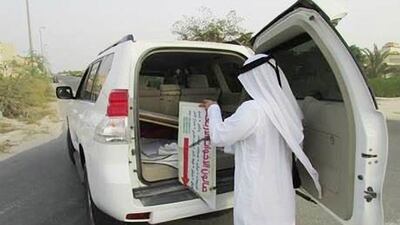ABU DHABI // A campaign is under way to remove illegal billboards from roadsides, roundabouts and public areas in the capital.
Abu Dhabi Municipality said it had been forced to act after many signs were installed, particularly in Al Shamkha, prompting warnings to be issued.
“The campaign covered several areas at Al Shamkha, where random advertising signs were monitored at Al Shamkha 7 and Al Shamkha 6 roundabout on the way to Al Falah Bridge,” said a spokesman.
The boards were removed with police assistance, the Centre of Waste Management and medical support company AlphaMed.
“Through customer service centres, the municipality issues billboard installation permits duly approved by the competent authorities in Abu Dhabi at locations conforming to the safety standards of roads and sidewalks, maintaining the general outlook and in harmony with public utilities in streets, roundabouts, lamp posts and other service facilities,” the spokesman added.
Illegally-installed signs had led to neighbourhoods becoming cluttered, and also undermined public safety, said the authorities.
Many signs were affixed to directional signs.
The municipality urged the public to seek permission before installation.
Streets in and around Al Shamkha will now be monitored to prevent illegal signs being put up.
Businesses and individuals must gain permission before installing billboards.
A copy of the proposed design must be provided to the municipal centre along with the locations of the signs.
This will inform supervisors that the billboards are licensed and, therefore, not to be removed.
All licensed boards must also have the start and finishing date for the permit on the signs.
newsdesk@thenational.ae

